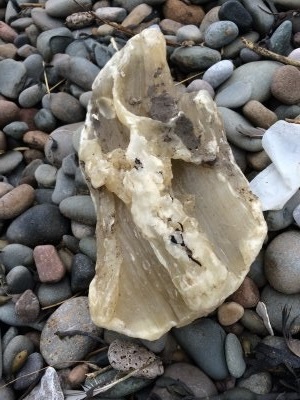
Wyre has experienced incidents of palm oil washing up on our beaches. This can be fatal for dogs when eaten. If you spot palm oil, it is important not to remove it yourself and to report what you have seen to the council.
What is palm oil and where does it come from?
Palm oil is a type of oil derived from palm trees which is used in cooking, soap and biofuels. There have been several cargo incidents off the North West coast over recent decades and it is estimated that tonnes of palm oil remains in the wreckages. Under the current regulations, ships are allowed to clean their tanks after delivering the substance to the UK, dumping a limited amount of the contaminated residue at sea, provided they do so more than 12 miles from the shore.
Is it dangerous?
Palm oil debris is harmless to humans, however, contact should be avoided as long term exposure to sea water may result in the item turning rancid. Palm oil can be fatal to dogs if eaten. Unfortunately dogs are attracted to the smell, so pet owners are advised to stay alert if walking your dog on the coast when a warning is in place, especially around tidelines.
What should I do if I spot it?
If you spot palm oil on the beach do not try to remove it yourself. Contact the council with as much information as possible. Tell the council the date/time the substance was seen, the location, estimated size, estimated quantity and colour of the deposit. Keep an eye on your dog at all times. Putting them on a lead is advised as they are attracted to the smell. If you believe your dog has eaten palm oil you should get to a vet immediately, ideally within 30 minutes.
Report it
If you spot palm oil, please report it by calling 01253 891000, Monday - Friday between 9am - 5pm. Alternatively, if you are calling outside normal office hours (after 5pm on weekdays and all weekend) you should call 01253 895116.
